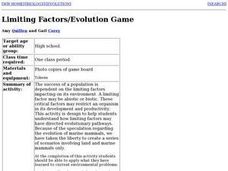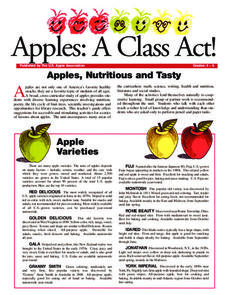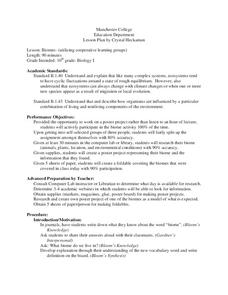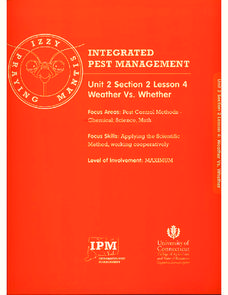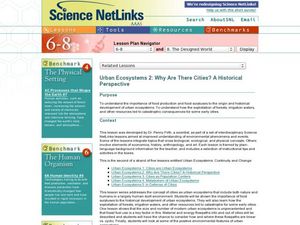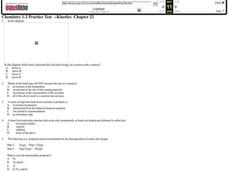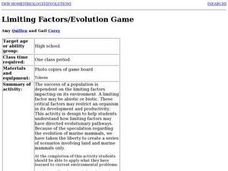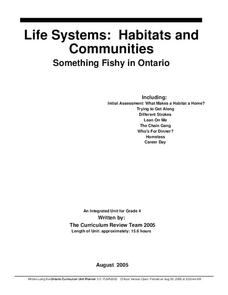Curated OER
Being Productive in the Arctic Ocean
High schoolers identify the three realms of the Arctic Ocean, and describe the relationships between these realms. They identify major factors that limit primary productivity in the Arctic Ocean.
Curated OER
Factors Which Affect the Rate of Chemical Reactions
Students complete an experiment with Alka-Seltzer and reaction rates. They control the rate in which gases are allowed to escape. They test their predictions and observe what happens during the experiment.
One Hen
Making Choices
When choosing what foods to eat, there are a lot of factors to consider. To help make the decision a little easier, young learners work in small groups developing short plays, stories, or advertisements that address the different issues...
Curated OER
Limiting Factors/Evolution Game
Students play a board game with provided cards which help them realize that limiting factors may restrict an organism in its development and productivity and direct evolutionary pathways.
Curated OER
Fascinating Factors
Students observe biotic and abiotic things participating in an observational walk outside the school. They create a collage using pictures of biotic and abiotic items.
Curated OER
Urban Ecosystems 2: Why are There Cities? A Historical Perspective
Second in a series of five lessons, this lesson encourages preteens to consider cities as urban ecosystems. First, they keep a food diary for a few days. They visit the Natrional Agricultural Statistics Service website for current data...
Curated OER
A Yen for Maximum Residue Limits in Food
Future public health officials or agriculturists read an article and answer questions concerning the Japanese regulations for pesticide exposure. They compare the maximum residue limit for two, 4-D of Japan with other countries. This is...
US Apple Association
Apples: A Class Act! (Grades 4–6)
Middle schoolers have a bushel of fun as they engage in activities and research core facts about apples. Packed with suggestions for in-class activities and out-of-class research, the colorful 6-page packet is sure to satisfy hungry...
Curated OER
Particle Size and Oil Production
Students investigate how permeable different materials are. In this physics lesson, students determine what affects permeability and how permeability relates to oil production.
Curated OER
Biomes
Tenth graders research locations of biomes and their barriers. In this biomes lesson plan, 10th graders examine location, environmental conditions, and species of plants and animals that live in the biome. Students take notes and create...
University of Connecticut
Weather Vs. Whether
Monarch butterfly populations have decreased by 90 percent over the past 20 years due to misuse and ineffectiveness of some pesticides. Given the challenge to increase pesticide safety and effectiveness, the class, through discussion,...
Curated OER
What's the Fizz Factor
Students as a class create a fountain using both coke soda, and mentos candy. In this science lesson, students test which combination of coke and mentos products produce the tallest fountain. Students use the scientific method to track...
Curated OER
Sustainable Agriculture: Soils And Food Production
Ninth graders recognize differences in soil quality from one area to another. They describe the importance of organic matter in soil health and suggest ideas that help provide adequate food supplies for the world. The interview a person...
Curated OER
Urban Ecosystems 2: Why Are There Cities? A Historical Perspective
Students investigate the importance of food surpluses to the historical development of urban ecosystems.
Curated OER
Peanut Butter Broccoli
Fifth graders explore food production by viewing DNA presentations. In this genetic engineering lesson, 5th graders discuss the foods they typically eat at home and how many common foods are engineered in a way that can produce a bigger...
Curated OER
Kinetics
In this kinetics worksheet, students review activation energy, rate of reaction, and reaction mechanisms. This worksheet has 13 multiple choice questions.
Curated OER
Limiting Factors/ Evolution Game
Students will understand the relationship between limiting factors and evolution. They will be able to hypothesize possible evolutionary pathways for modern day organisms.
Concord Consortium
Stoichiometry and Balancing Equations
Is your stoichiometry lesson plan just not adding up? Incorporate an exciting interactive to balance things out! Chemistry scholars manipulate the number of molecules added to the reaction vessel, then observe as bonds form and break as...
Curated OER
Investigating What Makes Fruit Go Brown
Is there anything that can be done to slow the browning of fruit once it has been cut? High schoolers determine the answer through five different investigations involving apples, potatoes, and chemical reactions. After each experiment,...
Curated OER
Wild and Wetlands
Upper graders identify the major characteristics of a wetland. They explore the human factors that change a wetland and write a descriptive paragraph about wetlands. This comprehensive lesson also has an interactive "Watershed Game"...
Curated OER
Designing a Real Life Ecosystem!
Students research abiotic and biotic factors concerning the concept of an ecosystem. Record and analyze data collected. Write a lab report in proper and scientific format with thinking and analytical skills. Work as a cooperative team.
Curated OER
Something Fishy in Ontario
Students create a diorama of the habitat of the fish of their choice, along with a research paper. They research habitats, the factors which affect specific habitats, and how fish adapt to different habitats in order to meet their unique...
Science Geek
Reaction Kinetics
Show your classes the science behind rates of reactions with a presentation that explains factors that affect the rate, activation energies, exothermic and endothermic processes, and the proportionality of the product and reactant rates.
Science 4 Inquiry
The Yin and Yang of Photosynthesis: Day vs. Night
Floating fragments of elodea can grow even without roots. Young scientists use eldoea plants to observe the oxygen production from photosynthesis. They study the difference between having access to high amounts of light and low amounts...





